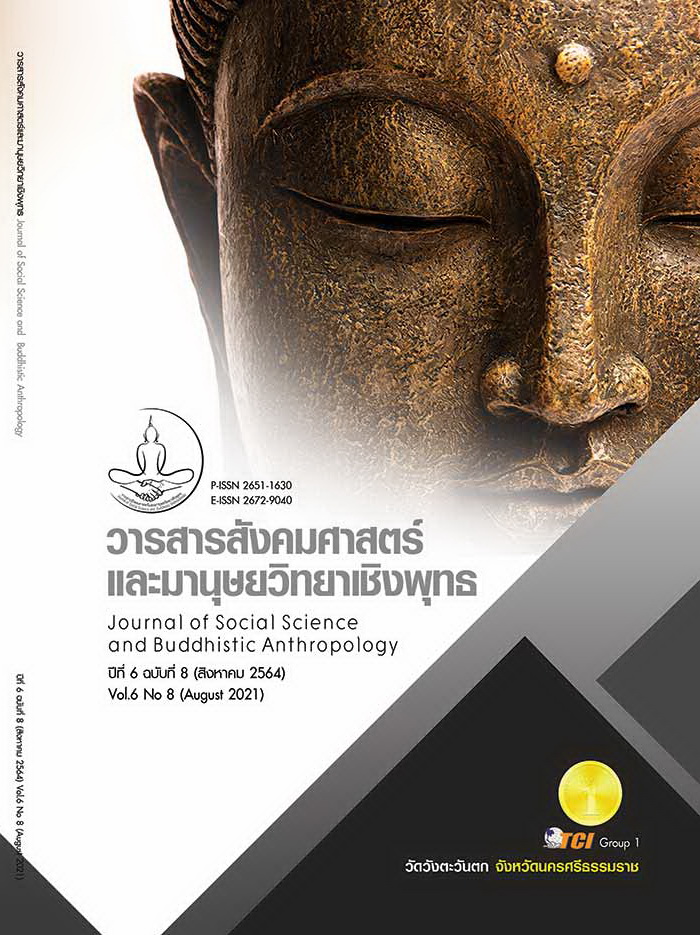BUILDING A SELF-RELIANCE LEARNING ACTIVITY BASE IN BAN KHIRI WONG COMMUNITY APPROACH THE LESSONS ON PHILOSOPHY OF PHILOSOPHY OF SUFFICIENCY ECONOMY FOR COMMUNITY DEVELOPMENT
Keywords:
Building an activity base, Self-reliance in community, Philosophy of Sufficiency Philosophy of Sufficiency Economy, Community DevelopmentAbstract
The Objectives of this research article were to 1. to study the factors affecting the self-reliance learning activity base construction and 2. Guidelines for promoting the building of self-reliance learning activities in Ban Khiri Wong community to enter Lesson Course Philosophy of Sufficiency Economy and Community Development Using a blended study method from quantitative data. And studying the qualitative data to support The population selection was 269 students. The quantitative data were collected by a questionnaire tool. The analyzed data were mean and standard deviation. Along with the qualitative data, the main informants were community leaders and the career group committee. Choose a specific type of 21 people. The tools used were interview and descriptive presentations. The study found that Factors affecting the creation of a self-reliance learning activity base in Ban Khiriwong community to access the lessons of philosophy of sufficiency economy and community development. Overall all aspects It was at a high level (μ = 4.47, σ = 0.56), respectively, as follows: 1) Social self-reliance. at the highest level (μ = 4.63, σ = 0.47) 2) self-sufficiency in technology at the highest level (μ = 4.55, σ = 0.51) 3) Psychological self-reliance. At a high level (μ = 4.44, σ.= 0.66) etc. Guidelines for promoting the creation of a learning activity base on self-reliance in Ban Khiriwong community for entry into the philosophy of sufficiency economy and community development coursework consisted of: 1) building an activity base at the family level; by creating a spirit of local conservation Develop professional skills within the family and then pass on the knowledge of professional skills. 2) Build an activity base at the community organization level. Beginning with the application of the Sufficiency Economy Philosophy 3) Building a base for community activities with effective methods of community knowledge management
References
กษมา พานแก้ว. (2551). การพึ่งตนเองของสมาชิกสถาบันเกษตรกรตามปรัชญาเศรษฐกิจพอเพียงของตำบล วังทอง อำเภอวังทอง จังหวัดพิษณุโลก. กรุงเทพมหานคร: มหาวิทยาลัยราชภัฏพระนคร.
กิดานันท์ มลิทอง. (2543). เทคโนโลยีการศึกษาและนวัตกรรม. (พิมพ์ครั้งที่ 2). กรุงเทพมหานคร: จุฬาลงกรณ์มหาวิทยาลัย.
จิราณีย์ พันมูล. (2554). กระบวนการพัฒนาชุมชนสู่วิถีเศรษฐกิจพอเพียง : กรณีศึกษาบ้านนาเวียง อำเภอเกาะคา จังหวัดลำปาง. ใน วิทยานิพนธ์ศิลปศาสตร์มหาบัณฑิต สาขาวิชาการบริหารการพัฒนาสังคม. สถาบันบัณฑิตพัฒนบริหารศาสตร์.
มานิตย์ ซาชิโย. (2555). รูปแบบการเรียนรู้ตลอดชีวิตของคนหลายวัยในศูนย์ตุ้มโฮมลูกหลานบ้านเหล่าลิง. ขอนแก่น: มหาวิทยาลัยขอนแก่น.
ส่งศรี ชมภูวงศ์. (2554). ระเบียบวิธีวิจัยทางสังคมศาสตร์. นครศรีธรรมราช: มหาวิทยาลัยมหามกุฏ.
สัญญา สัญญาวิวัฒน์. (2542). การพัฒนาชุมชนแบบจัดการ. กรุงเทพมหานคร: หจก เอมี่เทรดดิ้ง.
สุวิมล ว่องวาณิช. (2557). การวิจัยปฏิบัติการในชั้นเรียน (พิมพ์ครั้งที่ 17). กรุงเทพมหานคร: สำนักพิมพ์แห่งจุฬาลงกรณ์มหาวิทยาลัย.
อัยรวี วีระพันธ์พงศ์. (2557). ปัจจัยที่มีอิทธิพลต่อการพึ่งตนเองของชุมชน: กรณีศึกษาชุมชนคลองลัดมะยม เขตตลิ่งชัน กรุงเทพมหานคร. กาฬสินธุ์: วารสารรัฐศาสตร์และนิติศาสตร์ มหาวิทยาลัยราชภัฏกาฬสินธุ์.
Blatchford, E. (1994). Working together for community economic development in rural Alaska. Economic development review, 12(1), 41.45.
Peter, J. (2007). Organizational culture and identity. New Delhi: Sage Publication.









